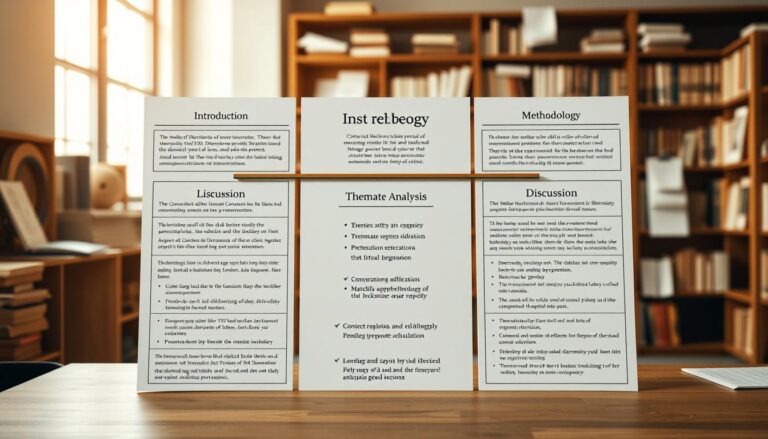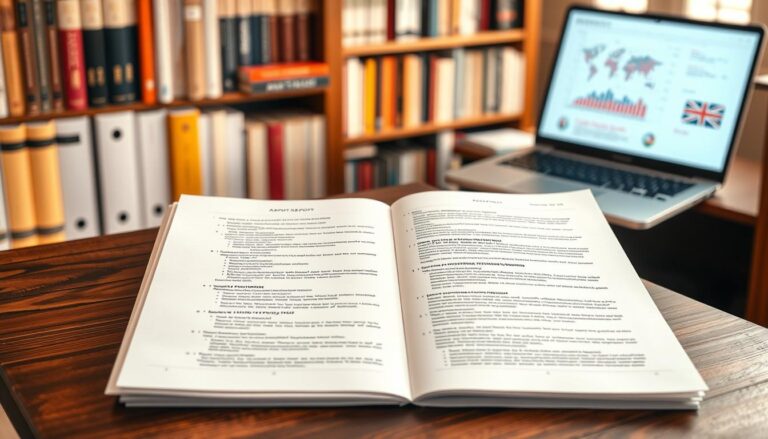When applying to universities, a well-crafted personal statement is crucial for a successful application. In Australia, university admissions often rely heavily on these statements to assess a candidate’s suitability.
A personal statement typically includes a mix of academic achievements, extracurricular activities, and career goals, providing a comprehensive view of the applicant’s profile.
Key Takeaways
- A well-structured personal statement is vital for university applications.
- Academic achievements and extracurricular activities are essential components.
- Clearly outlining career goals strengthens the application.
- Understanding application requirements is crucial.
- Referencing personal statement examples can provide valuable insights.
The Significance of Personal Statements in Australian University Applications
The personal statement is a vital component of Australian university applications, offering a glimpse into an applicant’s personality and motivations. It serves as a platform for applicants to showcase their unique qualities, experiences, and goals, making it an essential tool in the admission process.
How Personal Statements Influence Admission Decisions
Admission decisions in Australian universities are significantly influenced by personal statements. A well-crafted personal statement can tip the scales in favor of an applicant by demonstrating their passion, commitment, and suitability for the chosen course. It provides the admissions committee with a more nuanced understanding of the applicant beyond their academic achievements.
Differences Between Australian and International Personal Statement Requirements
Australian universities have distinct requirements for personal statements compared to their international counterparts. While international universities might focus on broader aspects such as global perspectives, Australian universities tend to emphasize the applicant’s connection to the Australian context, their understanding of the course, and how they plan to contribute to the university community.
The key to a successful personal statement lies in understanding these nuances and tailoring the application accordingly. By doing so, applicants can demonstrate their awareness of the specific requirements and expectations of Australian universities, thereby enhancing their application’s competitiveness.
What to Expect from a Personal Statement Writer in Australia
When considering a personal statement writer in Australia, it’s essential to understand the services they provide and how they can enhance your university application. A professional writer can help you craft a compelling narrative that highlights your strengths and achievements, making your application more attractive to Australian universities.
Services Provided by Professional Writers
Professional personal statement writer services typically include a range of offerings designed to help you create a standout personal statement. These services may include:
- Initial consultations to understand your goals and requirements
- Customized writing based on your academic background, work experience, and career aspirations
- Multiple drafts and revisions to ensure your personal statement meets the highest standards
- Editing and proofreading to eliminate errors and improve clarity
By leveraging these services, you can ensure that your personal statement is well-structured, engaging, and tailored to the specific requirements of Australian universities. For more information on how to get started, you can visit OzEssay’s Personal Statement Writing Service.

Ethical Considerations When Using Writing Services
While professional writing services can be incredibly helpful, it’s crucial to use them ethically. Universities in Australia take academic integrity seriously, and it’s essential to ensure that your personal statement is your own work. Professional writers can provide guidance and support, but the final product should reflect your own experiences and aspirations.
Typical Costs and Timeframes
The cost of hiring a personal statement writer in Australia can vary depending on the level of service required and the complexity of your application. Typically, you can expect to pay between $200 to $500 for a comprehensive writing service. The timeframe for completion can range from a few days to several weeks, depending on the writer’s workload and the number of revisions required.
By understanding what to expect from a personal statement writer, you can make informed decisions about your university application and increase your chances of success.
Essential Components of a Compelling Personal Statement
In the competitive landscape of Australian university admissions, a compelling personal statement can be your most powerful tool. It serves as an opportunity to showcase your academic achievements, relevant experiences, and future aspirations, setting you apart from other applicants.
Academic Achievements and Educational Background
Your academic achievements and educational background are fundamental elements of your personal statement. Highlighting your academic successes, such as high grades, academic awards, or research projects, demonstrates your capability and commitment to your chosen field. When discussing your educational background, focus on relevant courses, academic achievements, and any challenges you’ve overcome.
- Mention any notable academic achievements, such as being on the dean’s list or winning academic competitions.
- Discuss relevant coursework that has prepared you for your future studies.
- If applicable, highlight any academic challenges you’ve faced and how you overcame them.
Relevant Work Experience and Extracurricular Activities
Relevant work experience and extracurricular activities provide valuable evidence of your skills and character. Showcasing your ability to balance work and study, or to engage in meaningful extracurricular activities, can significantly enhance your personal statement. These experiences demonstrate your time management skills, teamwork abilities, and commitment to personal growth.
- Describe your work experience, focusing on skills and achievements relevant to your course.
- Mention any extracurricular activities that have contributed to your personal development.
- Highlight leadership roles or significant contributions you’ve made in these contexts.
Career Goals and Aspirations
Clearly articulating your career goals and aspirations is crucial. Your future plans should align with the course you’re applying for, demonstrating a clear understanding of how the program will help you achieve your objectives. This shows that you are motivated and focused on your future.
“The future belongs to those who believe in the beauty of their dreams.” – Eleanor Roosevelt
When outlining your career goals, be specific about how the course and institution will help you achieve them.
Motivation for Choosing the Specific Course and Institution
Explaining your motivation for choosing the specific course and institution is vital. Demonstrate that you’ve done your research by discussing specific aspects of the course and institution that align with your goals and interests. This shows your genuine interest and commitment to the program.
- Mention specific course features that attract you, such as unique subjects or teaching methods.
- Discuss the institution’s strengths, such as its reputation, faculty, or research opportunities.
- Highlight any other factors that influenced your decision, such as campus culture or location.
By incorporating these essential components, you can create a compelling personal statement that showcases your strengths and aspirations, making a strong case for your admission to an Australian university.
Crafting a Unique Personal Narrative for Australian Admissions
A personal narrative that balances personal stories with professional goals is crucial for a successful Australian university application. This balance is key to creating a compelling narrative that showcases not only an applicant’s academic achievements but also their personal growth and cultural perspectives.
Balancing Personal Stories with Professional Goals
When crafting a personal narrative, it’s essential to intertwine personal anecdotes with professional aspirations. This blend helps admissions committees understand an applicant’s motivations and how their experiences have prepared them for their chosen course. As noted by a leading Australian education expert, “A well-crafted personal narrative is one that weaves together an individual’s personal story with their academic and professional goals, providing a holistic view of their potential.”
“The narrative should reflect the applicant’s genuine voice and experiences, making it relatable and authentic.”
To achieve this balance, applicants should reflect on their personal experiences, highlighting challenges overcome and lessons learned, while also outlining their career objectives and how the chosen Australian university program aligns with these goals.

Demonstrating Character and Personal Growth
Australian universities value applicants who demonstrate resilience, adaptability, and a commitment to personal growth. The personal narrative should illustrate how the applicant has evolved over time, showcasing their ability to tackle challenges and their potential for future development.
Key elements to highlight include:
- Overcoming adversity
- Pursuing opportunities for personal development
- Engaging in community service or extracurricular activities
Highlighting Cultural Perspectives Relevant to Australian Context
Apart from showcasing personal and professional qualities, a personal narrative should also demonstrate an understanding and appreciation of the Australian cultural context. This can be achieved by discussing how one’s cultural background has influenced their worldview and how they plan to contribute to the diverse Australian academic community.
By incorporating these elements, applicants can create a unique and compelling personal narrative that not only meets the requirements of Australian university admissions but also stands out in a competitive applicant pool.
Tailoring Personal Statements for Different Australian Universities
To increase your chances of admission, it’s vital to adapt your personal statement to the unique characteristics of each Australian university you’re applying to. Different institutions have varying emphases and requirements, making a one-size-fits-all approach ineffective.
Research-Focused vs. Practical Application-Oriented Institutions
Australian universities can be broadly categorized into research-focused and practical application-oriented institutions. Universities like the University of Melbourne and Australian National University are renowned for their research excellence, while institutions like RMIT University focus on practical applications.
When applying to research-focused universities, highlight your academic achievements, research experience, and potential to contribute to the academic community. In contrast, practical application-oriented universities value relevant work experience and industry connections.
Addressing Specific Program Requirements
Each program within an Australian university may have its own set of requirements. For instance, a business program might require evidence of leadership skills, while an engineering program might emphasize problem-solving abilities.
| Program | Key Requirements | Personal Statement Focus |
|---|---|---|
| Business | Leadership skills, entrepreneurial spirit | Highlight leadership roles, business ideas |
| Engineering | Problem-solving, technical skills | Emphasize projects, technical achievements |
Regional Considerations for Different States and Territories
Australia’s states and territories have unique cultural and economic characteristics. For example, universities in New South Wales might value different attributes compared to those in Western Australia.
Understanding these regional nuances can help you tailor your personal statement to resonate with the local culture and needs, demonstrating your adaptability and awareness.
Common Mistakes to Avoid in Australian Personal Statements
To succeed in Australian university admissions, it’s essential to avoid common personal statement mistakes that can hinder an applicant’s chances. A well-crafted personal statement can make a significant difference in the application process.
Generic Content and Lack of Specificity
One of the most significant errors applicants make is submitting generic personal statements that lack specificity. Avoid using generic phrases or statements that could apply to any university or course. Instead, tailor your statement to the specific program you’re applying for, highlighting how your interests and goals align with the institution’s strengths.
Overemphasis on Academic Achievements
While academic achievements are crucial, overemphasizing them can make your personal statement seem one-dimensional. Balance is key; ensure that you also discuss relevant extracurricular activities, volunteer work, or personal experiences that demonstrate your skills and character.
| Aspect | Overemphasis | Balanced Approach |
|---|---|---|
| Academic Achievements | Focusing solely on grades and academic awards | Discussing academic achievements alongside extracurricular activities |
| Personal Qualities | Omitting personal qualities and characteristics | Highlighting personal growth, leadership skills, and teamwork experiences |
Cultural Misunderstandings and Inappropriate Language
Cultural misunderstandings can arise when applicants are not familiar with the cultural nuances of Australia. Be mindful of the language and tone used in your personal statement, avoiding expressions or idioms that may not be universally understood or appreciated.
Technical Errors and Formatting Issues
Technical errors, such as grammatical mistakes or formatting issues, can significantly detract from the quality of your personal statement. Proofread your statement multiple times, and consider seeking feedback from mentors or professionals to ensure it is error-free and well-structured.
By avoiding these common mistakes, applicants can significantly enhance their personal statements, making them more compelling and effective in the Australian university admissions process.
The Process of Working with a Personal Statement Writer
The journey to a successful university application in Australia often involves collaborating with a personal statement writer to create a compelling narrative. This process is designed to help applicants present their strengths and aspirations effectively.
Initial Consultation and Information Gathering
The first step in working with a personal statement writer is the initial consultation. During this phase, the writer gathers essential information about the applicant’s academic background, career goals, and personal achievements. This stage is crucial for understanding the applicant’s unique strengths and challenges.
Draft Development and Revision Process
Following the initial consultation, the personal statement writer begins drafting the personal statement. This involves crafting a narrative that highlights the applicant’s qualifications and motivations. The draft is then reviewed and revised based on feedback from the applicant to ensure it accurately represents their story.
Final Review and Submission Preparation
In the final stage, the personal statement writer and the applicant review the statement together to ensure it meets the application requirements. The writer makes any necessary adjustments to enhance clarity and coherence, preparing the final document for submission to Australian universities.
By understanding and engaging in this process, applicants can maximize their chances of success in the competitive Australian university admissions landscape.
DIY Guide: Writing Your Own Personal Statement for Australian Applications
Writing a personal statement for Australian university applications is a crucial step that requires careful consideration and planning. A well-crafted personal statement can significantly enhance your chances of securing a place at your preferred institution.
Researching University-Specific Requirements
Before starting to write your personal statement, it’s essential to research the specific requirements of the universities you’re applying to. Each institution may have unique criteria or prompts that you need to address.
Key steps in researching university requirements:
- Review the university’s website for application guidelines
- Check for specific prompts or questions
- Understand the word count and formatting requirements
Structuring Your Statement Effectively
A well-structured personal statement is easier to read and more effective at conveying your message. Start with a strong opening that grabs the reader’s attention, followed by a clear and concise body, and conclude with a summary of your key points.
Self-Editing Tips and Peer Review Strategies
Once you’ve written your first draft, it’s crucial to edit and review your work. Check for grammar, spelling, and punctuation errors, as well as clarity and coherence.
Grammar and Style Considerations for Australian English
Australian English has its own set of spelling, grammar, and punctuation conventions. Ensure that your personal statement adheres to these standards to demonstrate your awareness and adaptability.
Formatting and Submission Guidelines
Pay close attention to the formatting requirements specified by the university, including file type, font, and margin settings. Ensure that your submission is timely and complete.
| Formatting Aspect | Guideline |
|---|---|
| File Type | PDF or Word Document |
| Font | Arial or Times New Roman, Size 12 |
| Margins | At least 1 inch on all sides |
By following these guidelines and tips, you can create a compelling personal statement that showcases your strengths and enhances your university application.
Conclusion: Making the Right Choice for Your Academic Future
Crafting a compelling personal statement is a crucial step in securing a place at a prestigious Australian university. By understanding the significance of personal statements and the services offered by professional writers, applicants can make informed decisions about their academic future.
A well-written personal statement can be the key differentiator in a competitive application process. Whether you choose to work with a personal statement writer in Australia or write your own statement, the importance of presenting a strong narrative cannot be overstated.
By focusing on your academic achievements, relevant work experience, and career goals, you can create a personal statement that showcases your strengths and demonstrates your commitment to your chosen field. As you move forward, remember that a well-crafted personal statement conclusion can leave a lasting impression on admissions committees.
Ultimately, making the right choice for your academic future requires careful consideration and planning. By investing time and effort into your personal statement, you can take a significant step towards achieving your academic goals.





